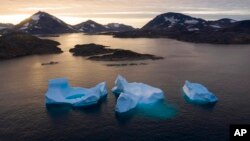The Biden administration plans to name an ambassador at large for the Arctic amid growing awareness of the potential strategic importance of the region, for which China is the latest major power to stake a claim.
It is not clear who the nominee will be, or when the nomination will be made, according to Politico. The nomination will be subject to Senate confirmation.
The geostrategic importance of the Arctic is growing as global warming makes the prospect of accessing the region's reserves of minerals and energy seem possible, and the development of new sea lanes likely.
Russia is expanding its military presence in the region, and China declared itself a "near-Arctic state" and its intent to establish a "Polar Silk Road" as part of it Belt and Road Initiative in a 2018 white paper.
With its "near-Arctic" status, the white paper says, China has the same rights as Arctic states, "including the right to conduct scientific research, navigate, perform flyovers, fish, lay submarine cables and pipelines, and even explore and exploit natural resources in the Arctic high seas."
With its northernmost tip located almost 1,500 kilometers south of the Arctic Circle, China lacks any Arctic territory. Eight nations have territory above the Arctic Circle: Canada, Denmark, Finland, Iceland, Norway, Sweden, Russia and the United States, with the northern reaches of Alaska.
Alaska Senator Lisa Murkowski had long pushed for the ambassadorship, writing in an op-ed for The Hill that "How we address the Arctic will shape the global order, so the U.S. cannot afford a diplomatic vacancy."
She pointed to the region's geopolitical importance, saying its "vast reserves of Arctic minerals can help meet skyrocketing global demand" and that Arctic shipping routes "promise to greatly shorten and cheapen global shipping regimes."
In calling for an Arctic ambassador in her Aug. 4 op-ed, Murkowski wrote, "The U.S. is the only Arctic nation without a dedicated Arctic ambassador or higher. Even some non-Arctic nations have Arctic ambassadors, including China, Japan, Singapore and South Korea."
The new position of ambassador-at-large for the Arctic Region will replace that of U.S. coordinator for the Arctic Region, a position established Jan. 1, 2020, and now held on a temporary basis by State Department Counselor Derek Chollet, who told Politico that the Biden administration sees "this moment as one of strategic opportunity."
Murkowski has "strongly" recommended that the first Arctic ambassador should "be an Alaskan with deep knowledge of the Arctic region and a holistic understanding of Arctic policy."
A NATO warning
NATO Secretary-General Jens Stoltenberg warned about Russia's military build-up in the Arctic and expressed concerns about China's growing presence in the Arctic last week after his first visit to Canada's Arctic region.
He noted that China plans to build the world's largest icebreaker and is investing tens of billions of dollars in energy, infrastructure and research projects in the North.
Stoltenberg continued, "Our response is a strong and predictable Allied presence in the region. We have already established a new NATO command for the Atlantic."
He cautioned that Russia and China are forming a strategic Arctic partnership.
"Beijing and Moscow have also pledged to intensify practical cooperation in the Arctic. This forms part of a deepening strategic partnership that challenges our values and interests," Stoltenberg said.
Wary of China
Since 2013, China has been an accredited observer to the Arctic Council, a regional organization whose members are Canada, Denmark, Finland, Iceland, Norway, Russia, Sweden and the U.S.
In the 2018 white paper, Beijing states that China is geopolitically close to the Arctic Circle and is "an important stakeholder in Arctic affairs" while describing the Arctic as a "community with a shared future for mankind."
The U.S. has stated its suspicions about Chinese designs on the Arctic for years. In May 2019, then U.S. Secretary of State Mike Pompeo said during a visit to Finland, "there are only Arctic states and non-Arctic states. No third category exists, and claiming otherwise entitles China to exactly nothing."
Some Arctic countries are becoming more skeptical about China's increasing interest in their region as well.
China's Economic Influence in the Arctic Region, a study released by the Swedish Defense Research Agency (FOI) in June said that "Nordic nations that previously welcomed Chinese investment with open arms are now wary of the risks of China's expanding influence."
The report noted that despite Chinese efforts to invest in the Arctic, few deals have been completed.
Oscar Almén, co-author of the report and senior researcher at FOI, said that some of these Chinese investment efforts have been canceled because of security concerns by the host states.
"In the case of Greenland, many of those investments have clearly been denied because of intervention. There has been an increasing weariness in the Nordic region and North America towards the intentions of the Chinese," Almén told VOA Mandarin.
The report noted that in 2016, the Danish government intervened when Chinese mining company General Nice Group tried to buy an abandoned naval base in Greenland.
Danish politicians didn't want to jeopardize their country's relationship with the U.S., reported Reuters, citing sources involved in the decision. The Danish government reached an agreement with the U.S. in 1951, which gave the latter military rights in Greenland to boost the defense of the Arctic and North America.
Another failed Chinese investment initiative came in 2018, when the Chinese Arctic and Antarctic Administration (CAA) tried to purchase Finland's Kemijärvi airport in Lapland. The Finnish Ministry of Defense blocked Beijing because the airport was located close to a strategic military range, according to local media.
The FOI report states that if China continues with its current level of domestic repression and assertive foreign policy, gaining the trust of the Nordic countries will be difficult.




